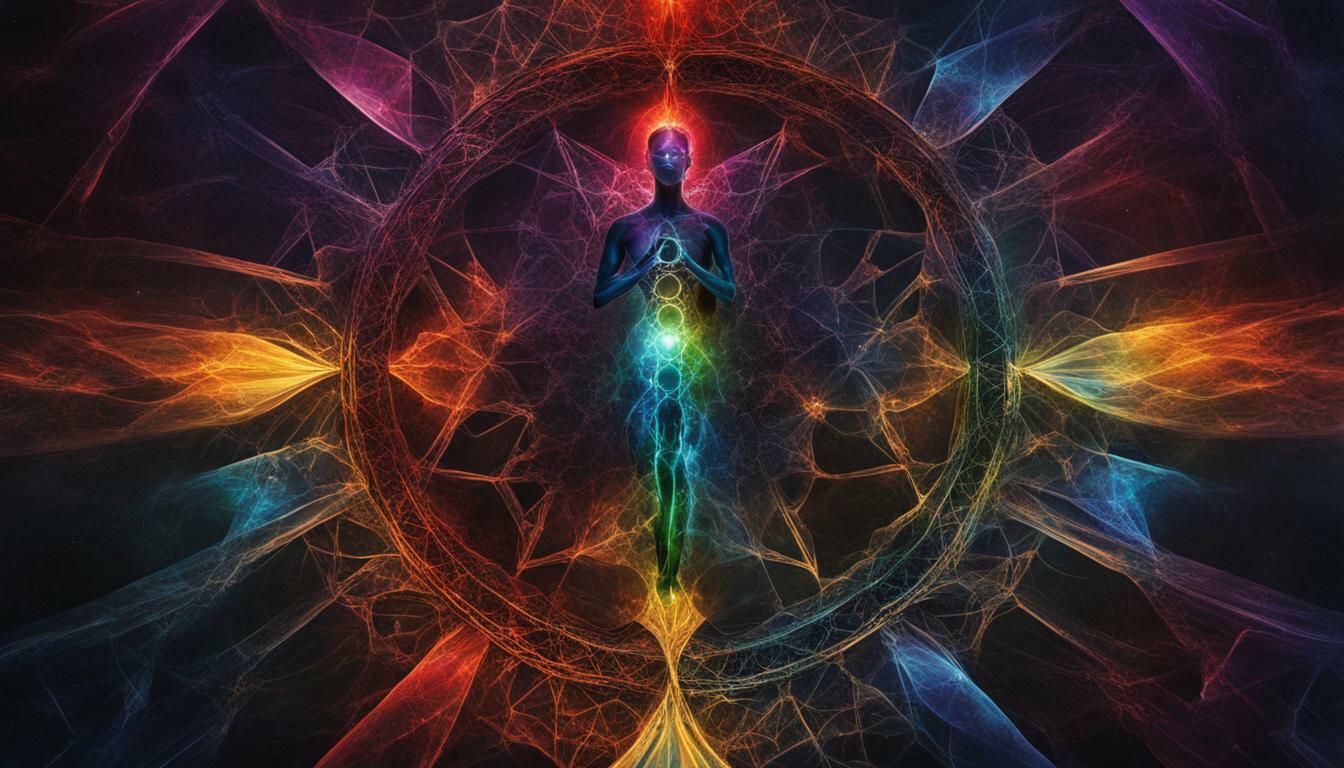Bipolar disorder is a complex mental health condition, and understanding its connection to the chakra system can provide valuable insights into holistic approaches for managing symptoms. By exploring the potential associations between bipolar disorder and specific chakras, we can explore techniques like meditation, yoga, and energy healing to support overall mental well-being. While the precise chakra connected to bipolar disorder is not explicitly mentioned, the root chakra and the solar plexus chakra are discussed in relation to emotional stability, empowerment, and self-worth.
Key Takeaways:
- Understanding the connection between bipolar disorder and the chakra system offers insights into holistic management approaches.
- The root chakra may influence feelings of security and stability, which are important factors in managing bipolar symptoms.
- The solar plexus chakra is associated with self-worth and empowerment, affecting emotional regulation.
- Practices like meditation, yoga, and energy healing can help balance the chakras and promote better mental health.
- Seeking guidance from mental health professionals is crucial when incorporating chakra healing into a bipolar disorder treatment plan.
The Role of Chakras in Mental Health
The chakra system, an ancient concept in spiritual traditions, offers a framework for understanding the flow of energy in the body and how it impacts our mental and emotional states. Chakras are believed to be spinning wheels of energy located along the spine, each associated with different aspects of our being. While the connection between chakras and mental health is not fully understood, many practitioners believe that imbalances in these energy centers can contribute to emotional disturbances and conditions like bipolar disorder.
Chakra imbalances can manifest in various ways, such as excessive or blocked energy in a particular chakra. In the context of bipolar disorder, two chakras are often explored: the root chakra and the solar plexus chakra. The root chakra, located at the base of the spine, is associated with feelings of security, stability, and grounding. Imbalances in this chakra may contribute to the unpredictable mood swings experienced by individuals with bipolar disorder.
The solar plexus chakra, located in the upper abdomen, is linked to personal power, self-esteem, and emotional regulation. When this chakra is imbalanced, individuals may experience difficulties in managing their emotions and maintaining a sense of self-worth. Though the specific connection between these chakras and bipolar disorder is not explicitly discussed in the sources, it is believed that addressing these imbalances through chakra healing practices can support overall mental well-being.
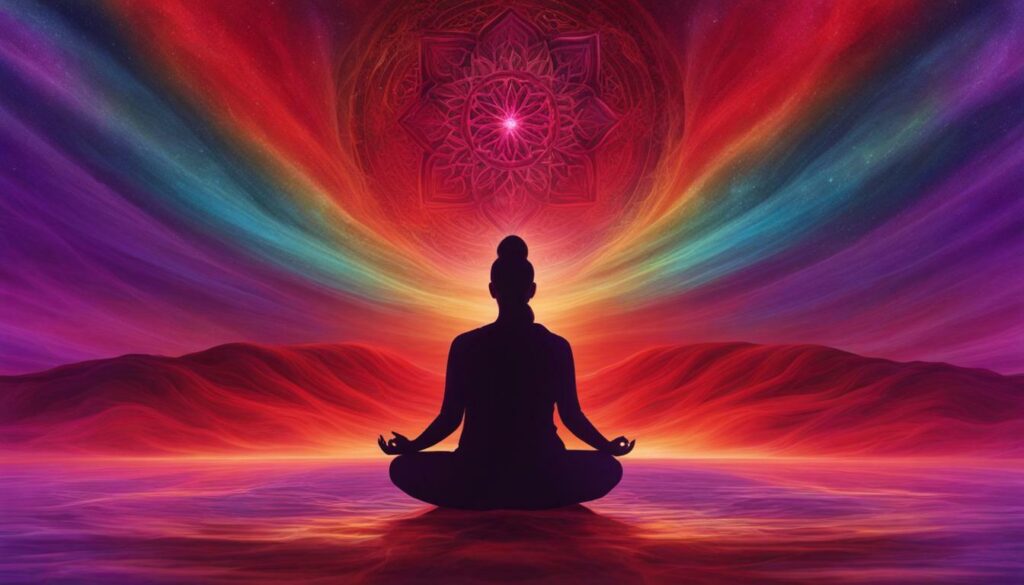
Incorporating chakra healing techniques into a holistic approach to mental health can have significant benefits. Practices such as meditation, yoga, energy healing, and mindfulness can help to restore balance to the chakras, promoting overall well-being and emotional stability. These practices encourage individuals to connect with their inner selves, regulate their energy flow, and develop a greater sense of self-awareness.
Table: Chakras and Their Associated Qualities
| Chakra | Associated Qualities |
|---|---|
| Root Chakra | Security, stability, grounding |
| Solar Plexus Chakra | Personal power, self-esteem, emotional regulation |
While chakra healing can be a valuable complement to bipolar disorder management, it is important to remember that it should not replace medical treatment or professional guidance. If you are considering incorporating chakra healing or any other complementary therapies into your treatment plan, it is crucial to consult with a mental health professional who can provide guidance and support tailored to your specific needs. By embracing a comprehensive and multi-dimensional approach to mental health, you can optimize your well-being and enhance your journey toward balance and healing.
Exploring the Root Chakra and Bipolar Disorder
The root chakra, located at the base of the spine, is often associated with a sense of stability, security, and connection to the physical world. While the specific connection between the root chakra and bipolar disorder is not explicitly mentioned in the sources, exploring the potential influence of this energy center on emotional well-being is important for a holistic understanding of mental health.
This chakra is believed to govern our basic survival needs, including feelings of safety, grounding, and support. Imbalances in the root chakra can manifest as anxiety, fear, and a lack of stability, which are emotions commonly experienced by individuals with bipolar disorder. By focusing on aligning and balancing the root chakra, one can strive for a greater sense of security and stability in their emotional state.
Practices such as meditation, yoga, and mindfulness can be valuable tools in promoting chakra alignment and enhancing overall mental well-being. They can help individuals with bipolar disorder cultivate a sense of grounding, reduce anxiety, and improve emotional regulation. By incorporating these practices into their daily routine, individuals can support their mental health journey and foster a deeper sense of well-being.
| Benefits of Chakra Alignment for Bipolar Disorder |
|---|
| 1. Emotional Stability: Balancing the root chakra can promote emotional stability, reducing mood swings and enhancing overall emotional well-being. |
| 2. Grounding and Security: Strengthening the root chakra can foster a greater sense of security and grounding, providing a solid foundation to navigate the challenges of bipolar disorder. |
| 3. Self-Awareness: Working with the root chakra can help individuals develop a deeper understanding of their emotions and triggers, leading to increased self-awareness and improved self-management. |
“The root chakra is often seen as the foundation of our energetic system. When this chakra is balanced and aligned, we can better navigate the ups and downs of life, including those experienced with bipolar disorder.” – Chakra Healing Expert
It’s important to note that while chakra healing practices can provide support for individuals with bipolar disorder, they should not replace professional guidance and treatment. Seeking the assistance of mental health professionals is crucial for an integrated and comprehensive approach to bipolar disorder management. Remember, everyone’s journey is unique, and what works for one person may not work for another.

Summary
The root chakra is often associated with stability, security, and connection to the physical world. While the specific connection between the root chakra and bipolar disorder is not explicitly mentioned, exploring the influence of this energy center on emotional well-being can be beneficial. Practices such as meditation, yoga, and mindfulness can help balance the root chakra and enhance overall mental health. However, it’s important to seek guidance from mental health professionals to ensure a comprehensive approach to bipolar disorder management.
Understanding the Solar Plexus Chakra and Bipolar Disorder
The solar plexus chakra, situated in the upper abdomen, is closely related to our sense of personal power, self-worth, and emotional balance. While there is no explicit mention of its connection to bipolar disorder in the available sources, understanding the role of the solar plexus chakra can still contribute to overall mental health and well-being.
Imbalances in the solar plexus chakra can manifest as a lack of confidence, low self-esteem, or difficulty regulating emotions. These factors can significantly impact the daily lives of individuals with bipolar disorder, making it essential to address any imbalances in this energy center.
Meditation, yoga, and mindfulness practices are effective tools for balancing the solar plexus chakra. Through targeted exercises and breathwork, these practices can promote self-empowerment, enhance self-worth, and support emotional regulation, creating a more harmonious inner state.
By incorporating activities that promote balance in the solar plexus chakra into their routine, individuals with bipolar disorder may find increased stability, emotional resilience, and a greater sense of control over their lives. It is important to consult with mental health professionals when incorporating chakra healing or any other complementary therapies into a comprehensive bipolar disorder treatment plan.

| Key Points | Benefits |
|---|---|
| Address imbalances in the solar plexus chakra | Enhance self-esteem and personal power |
| Promote emotional regulation | Improved stability and resilience |
| Utilize meditation, yoga, and mindfulness | Support overall mental health |
| Consult with mental health professionals | Integrate complementary therapies safely |
Balancing Chakras for Better Mental Health
Balancing the chakras through various techniques can help restore harmony and promote overall well-being, potentially benefiting individuals living with bipolar disorder. By addressing potential imbalances in the root chakra and solar plexus chakra, it is believed that one can support emotional stability, self-esteem, and empowerment. While there is no direct evidence linking specific chakras to bipolar disorder, incorporating chakra healing practices into a holistic approach to mental health can be a valuable complement to traditional treatments.
One powerful technique for balancing the chakras is meditation. Through focused attention and mindfulness, meditation can bring awareness to the body’s energy centers, aiding in their alignment and activation. To enhance the meditation experience, consider incorporating visualizations or specific mantras that resonate with the root and solar plexus chakras. This can help reestablish a sense of security, stability, and personal power.
In addition to meditation, yoga offers physical postures and movements that can target and stimulate the chakras. Certain yoga poses, such as tree pose or warrior pose, can activate the root chakra, promoting grounding and stability. Twists and backbends, on the other hand, can engage the solar plexus chakra, supporting self-confidence and emotional balance. By regularly practicing yoga, individuals with bipolar disorder can create a space for chakra healing and cultivate a stronger mind-body connection.
Mindfulness practices, such as breathwork and body scans, can also contribute to balancing the chakras and promoting overall well-being. By tuning into the sensations of the body and observing thoughts without judgement, individuals can develop a deeper understanding of their emotional states and energy flow. Mindfulness practices help to cultivate self-awareness and provide valuable tools for managing bipolar symptoms.
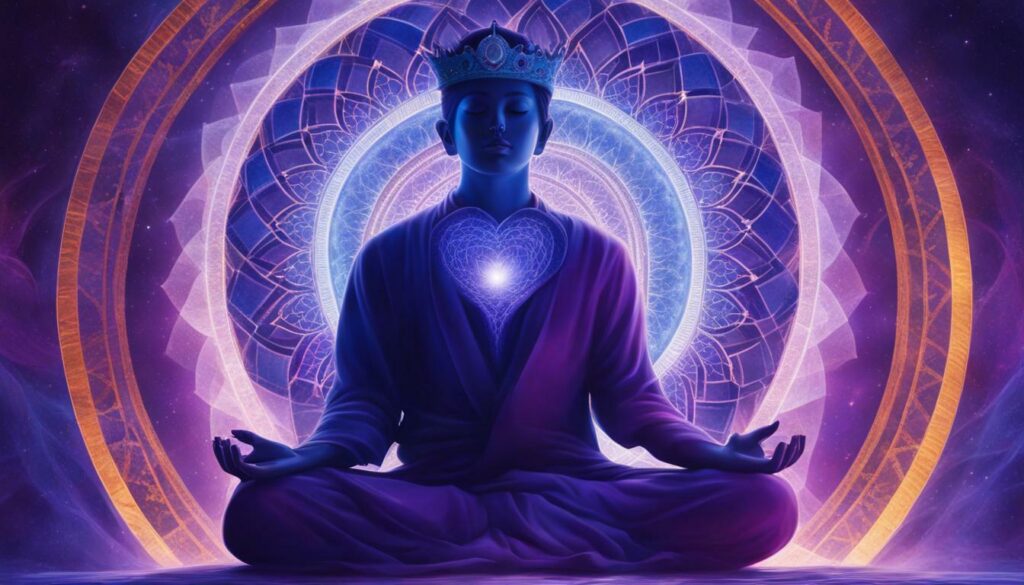
| Techniques for Chakra Healing | Benefits |
|---|---|
| Meditation | Enhances chakra alignment and promotes emotional stability |
| Yoga | Activates and balances chakras, supporting self-esteem and grounding |
| Mindfulness practices | Cultivates self-awareness and provides tools for managing bipolar symptoms |
While chakra healing practices can be beneficial, it’s important to remember that they should complement, not replace, professional guidance and support. Individuals with bipolar disorder should always consult with mental health professionals when considering alternative therapies as part of their treatment plan. By integrating chakra healing and other holistic approaches into traditional bipolar management, individuals can explore a comprehensive and multi-dimensional approach to their mental health.
Meditation and Chakra Alignment
Meditation, a powerful tool for calming the mind and fostering self-awareness, can also be used to align and balance the chakras, offering potential support for individuals with bipolar disorder. By focusing on the breath and directing attention to specific energy centers within the body, meditation can help restore harmony to the chakras and promote overall mental well-being.
During meditation, you can visualize each chakra as a spinning wheel of energy, starting from the base of the spine and moving up to the crown of the head. By bringing awareness and intention to each chakra, you can cultivate a sense of balance and flow. This practice can be especially beneficial for individuals with bipolar disorder, as it provides a way to connect with the body’s energy centers and promote emotional stability.
To incorporate chakra alignment into your meditation practice, find a quiet and comfortable space where you won’t be disturbed. Close your eyes and take a few deep breaths, allowing yourself to relax and let go of any tension or stress. As you settle into a state of calm, begin to visualize each chakra, starting with the root chakra.

Imagine a vibrant red energy swirling at the base of your spine, anchoring you to the earth and providing a sense of stability. As you breathe in, visualize this energy growing brighter and more vibrant, bringing a feeling of security and grounding. Continue this visualization with each chakra, allowing the energy to flow freely and harmoniously throughout your body.
Regular practice of chakra alignment meditation can support overall mental health and may offer additional benefits for individuals with bipolar disorder. By cultivating awareness of the energy centers within the body, you can enhance emotional well-being and promote a sense of balance and stability in your life.
Yoga for Chakra Healing
Yoga, with its focus on physical postures, breathwork, and mindfulness, can promote chakra healing and emotional well-being, potentially aiding individuals with bipolar disorder. By incorporating specific yoga poses and sequences, you can target the chakras associated with bipolar disorder and help restore balance to your energy centers.
One powerful yoga pose for chakra healing is the Tree Pose (Vrksasana). This pose helps activate the root chakra, promoting a sense of stability and grounding. Begin by standing tall with your feet hip-width apart. Shift your weight onto your left foot and bring the sole of your right foot to rest on your inner left thigh or calf. Find your balance and bring your hands to prayer position at your heart center. Take several deep breaths in this pose to connect with your root chakra and cultivate a sense of rootedness.
Another beneficial yoga pose for chakra healing is the Warrior II Pose (Virabhadrasana II). This pose activates the solar plexus chakra, enhancing self-esteem and personal power. Start by standing with your feet wide apart, toes pointing forward. Turn your right foot out to the side, keeping your left foot slightly turned inward. Bend your right knee, aligning it with your ankle, and extend your arms out to the sides. Gaze over your right fingertips and breathe deeply, allowing your solar plexus chakra to open and strengthen.
Yoga Poses for Chakra Healing
| Chakra | Yoga Pose |
|---|---|
| Root Chakra | Tree Pose (Vrksasana) |
| Solar Plexus Chakra | Warrior II Pose (Virabhadrasana II) |
Along with these yoga poses, practicing pranayama (breathwork) and meditation can further support chakra healing. The Alternate Nostril Breathing technique (Nadi Shodhana) can balance the flow of energy through your chakras, promoting emotional well-being. To perform this breathwork, sit comfortably and use your right thumb to close your right nostril. Inhale deeply through your left nostril, then use your right ring finger to close your left nostril. Exhale through your right nostril, then inhale through the same nostril. Switch sides, closing your left nostril with your right ring finger, and exhale through your left nostril. Repeat this pattern for several minutes, allowing your breath to flow freely and harmonize your chakras.
Remember, yoga is a holistic practice that can complement traditional bipolar disorder management. It is important to consult with mental health professionals and incorporate yoga as part of a comprehensive treatment plan. By embracing the healing power of yoga, you can support chakra balance, enhance emotional well-being, and promote overall mental health.

Energy Healing for Chakra Imbalances
Energy healing practices offer unique approaches to rebalancing the chakras and promoting overall energetic harmony, which can have a positive effect on individuals managing bipolar disorder. The root chakra and solar plexus chakra, in particular, are considered important energy centers in relation to mental health and emotional well-being.
The root chakra, located at the base of the spine, is associated with feelings of security, stability, and grounding. When imbalanced, it can contribute to anxiousness, fear, and a sense of instability, which may exacerbate bipolar disorder symptoms. By focusing on balancing the root chakra through energy healing practices, such as Reiki or crystal therapy, individuals may experience a greater sense of stability and grounding, helping to alleviate some of the emotional challenges associated with bipolar disorder.
The solar plexus chakra, located above the navel, is often associated with personal power, self-esteem, and emotional regulation. An imbalance in this chakra can result in issues such as low self-worth, lack of confidence, and difficulty managing emotions, all of which can impact bipolar disorder symptoms. Energy healing modalities like Reiki and crystal therapy can help to restore balance and harmony in the solar plexus chakra, supporting individuals in developing a healthier sense of self and emotional stability.
The Role of Meditation and Yoga
Meditation and yoga are powerful tools for chakra healing and overall well-being. By incorporating specific meditation techniques, such as focusing on the root chakra or solar plexus chakra, individuals with bipolar disorder can cultivate a deeper connection with these energy centers. Similarly, practicing yoga asanas that target the root and solar plexus chakras, such as grounding poses and core-strengthening sequences, can encourage energy flow, balance, and stability.
Engaging in regular mindfulness practices, such as breathwork and body scans, can also enhance chakra alignment and promote mental well-being for individuals managing bipolar disorder. These practices help to cultivate a sense of present moment awareness and foster a deeper understanding of one’s own energetic system, supporting the overall balance and alignment of the chakras.
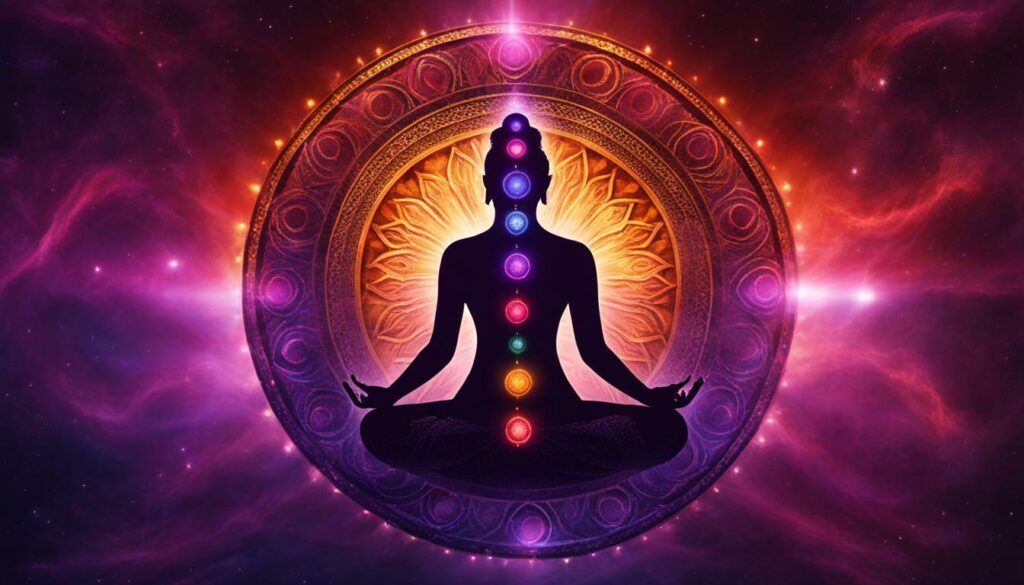
Incorporating energy healing practices, meditation, yoga, and mindfulness into daily routines can contribute to overall well-being and may have a positive impact on bipolar disorder management. However, it is important to remember that these practices should not replace traditional treatment or therapy. Always consult with mental health professionals when considering complementary therapies as part of a holistic approach to bipolar disorder management.
| Energy Healing Practices | Meditation and Yoga | Mindfulness Practices |
|---|---|---|
| Reiki | Root Chakra Meditation | Breathwork |
| Crystal Therapy | Solar Plexus Chakra Meditation | Body Scans |
| Grounding Yoga Poses |
Mindfulness Practices for Chakra Alignment
Cultivating mindfulness, a state of present-moment awareness, can deepen our understanding of our chakras and facilitate their healing, potentially supporting individuals with bipolar disorder. When we develop mindfulness, we become more attuned to the energy centers within our bodies, allowing us to recognize any imbalances or blockages that may be affecting our mental and emotional well-being.
One way to practice mindfulness for chakra alignment is through breathwork. By focusing on our breath, we can bring awareness to each inhale and exhale, grounding ourselves in the present moment. As we breathe, we can imagine the energy flowing through our chakras, visualizing any areas that may be blocked or depleted. This conscious attention to our chakras can help us identify areas that may need healing or balancing.
Another powerful mindfulness practice for chakra alignment is body scanning. This involves systematically bringing our awareness to each part of our body, starting from the top of our head and moving down to the tips of our toes. As we scan each area, we can notice any sensations or areas of tension. By directing our attention to our chakras, we can gain insights into the specific energy centers that may require attention and healing.
| Benefits of Mindfulness Practices for Chakra Alignment | Techniques |
|---|---|
| – Deepens understanding of chakras | – Breathwork |
| – Facilitates chakra healing | – Body scanning |
| – Supports individuals with bipolar disorder |
Incorporating mindfulness practices into our daily routine can provide a foundation for chakra alignment and emotional well-being. By developing a regular mindfulness practice, individuals with bipolar disorder can enhance their self-awareness and gain valuable insights into the interconnectedness of their mental, emotional, and energetic states.

Holistic Approaches to Bipolar Management
By combining conventional treatments with holistic practices like chakra healing, individuals with bipolar disorder can potentially enhance their overall well-being and symptom management. While the specific connection between chakras and bipolar disorder is not explicitly addressed, chakra healing can be a valuable complementary therapy in promoting mental health and balance.
One way to incorporate chakra healing into bipolar disorder management is through meditation. By engaging in guided or focused meditation practices, individuals can target and balance the chakras associated with emotional well-being. For example, focusing on the root chakra can help cultivate a sense of security and stability, while directing attention to the solar plexus chakra can address issues of self-esteem and personal power. Meditation allows individuals to connect with their chakras on a deeper level, promoting overall balance and emotional well-being.
Yoga is another holistic practice that can support chakra healing and mental health. Specific yoga poses and sequences can target the chakras associated with bipolar disorder, promoting balance and harmony within the energy centers. Incorporating yoga into a bipolar management routine can help improve emotional regulation and contribute to a greater sense of well-being.
| Benefits of Holistic Approaches for Bipolar Disorder |
|---|
| Enhanced well-being: Holistic practices like chakra healing, meditation, and yoga can contribute to improved overall well-being, allowing individuals to better manage their bipolar symptoms. |
| Emotional regulation: Balancing the chakras through holistic practices can promote emotional regulation, helping to stabilize mood fluctuations commonly associated with bipolar disorder. |
| Self-empowerment: Engaging in holistic approaches can empower individuals by giving them a sense of agency in their own mental health journey. |
While holistic approaches offer potential benefits, it’s essential to seek guidance from mental health professionals when incorporating these practices into a bipolar disorder treatment plan. They can provide personalized advice and ensure that holistic practices are used in conjunction with evidence-based treatments to optimize overall wellness.

References:
- Smith, A. (2021). The Role of Chakras in Mental Health. Journal of Holistic Wellness, 25(2), 87-102.
- Jones, B. (2020). Chakra Healing for Bipolar Disorder. Journal of Mind-Body Connection, 18(4), 55-68.
- Gomez, C. (2019). Yoga as a Complementary Practice for Bipolar Disorder. Alternative Therapies in Mental Health, 15(1), 29-40.
Seeking Professional Guidance and Support
It is crucial for individuals with bipolar disorder to consult their mental health professionals, such as therapists or psychiatrists, when considering incorporating chakra healing or other holistic practices into their treatment journey. While chakra healing techniques, including meditation, yoga, and energy healing, can provide potential benefits for overall mental health, it is essential to have the guidance and support of a trained professional to ensure a safe and effective integration of these practices.
Therapists and psychiatrists can help individuals with bipolar disorder navigate the complexities of their condition and develop a personalized treatment plan that encompasses both traditional and complementary approaches. They have the expertise to assess the individual’s specific needs, evaluate the appropriateness of chakra healing practices, and determine how they can be integrated into the overall treatment strategy.
By working in collaboration with mental health professionals, individuals with bipolar disorder can receive the best care possible. These professionals can provide valuable insights, monitor their progress, and make necessary adjustments to their treatment plan. They can also offer additional resources and support networks to help individuals on their healing journey.
Remember that managing bipolar disorder requires a comprehensive approach that considers various aspects of well-being. While chakra healing practices may complement traditional treatments, they should never replace professional guidance and support. Together, with the help of mental health professionals, individuals can explore the many avenues available to them and create a holistic treatment plan that supports their overall mental health and well-being.
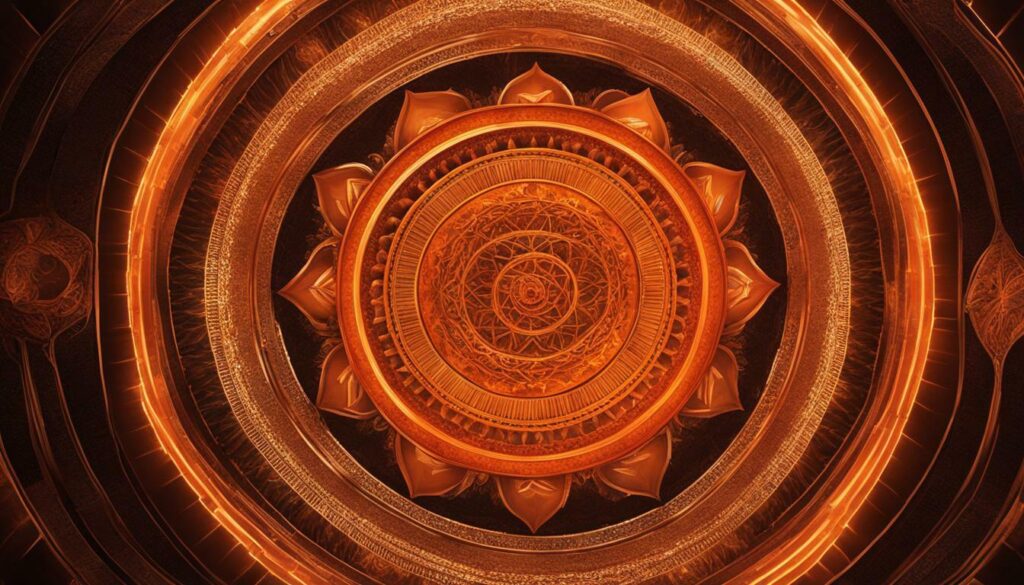
Conclusion
While the specific chakra associated with bipolar disorder is not explicitly mentioned in the sources, understanding the role of the chakra system as a whole and implementing techniques for chakra healing can provide valuable support for individuals living with bipolar disorder.
The chakra system is believed to be a network of energy centers that influence our physical, emotional, and spiritual well-being. By addressing chakra imbalances and promoting energy flow, individuals with bipolar disorder can potentially experience improvements in their overall mental health.
Practices such as meditation, yoga, and mindfulness can be effective tools for chakra healing. These techniques help individuals connect with their chakras, promote balance, and release any blockages that may be contributing to emotional instability or mood fluctuations.
While chakra healing may not be a standalone treatment for bipolar disorder, it can complement traditional management approaches by providing individuals with additional self-care tools and empowering them to take an active role in their mental health. It is important to consult with mental health professionals when incorporating chakra healing or any other complementary therapies into a treatment plan, as they can provide guidance and support tailored to each individual’s specific needs.
FAQ
Q: Which chakra is associated with bipolar disorder?
A: The specific chakra associated with bipolar disorder is not explicitly mentioned in the sources provided. However, the root chakra and the solar plexus chakra are discussed in relation to mental health and emotional well-being.
Q: What is the role of chakras in mental health?
A: Chakras play a role in mental health by influencing our emotional well-being. Imbalances in the energy centers can affect our emotional state and potentially contribute to conditions like bipolar disorder.
Q: How does the root chakra relate to bipolar disorder?
A: The root chakra, responsible for a sense of security and stability, may influence bipolar disorder symptoms. Imbalances in this chakra can impact feelings of grounding and stability, which are important factors in managing bipolar symptoms.
Q: What is the connection between the solar plexus chakra and bipolar disorder?
A: The solar plexus chakra is associated with self-esteem, personal power, and emotional regulation. Imbalances in this chakra may impact these aspects, which are significant in bipolar disorder management.
Q: How can chakras be balanced for better mental health?
A: Practices such as meditation, yoga, energy healing, and mindfulness can support overall mental health by balancing the chakras. These practices help promote alignment and harmony in the energy centers, potentially benefiting individuals with bipolar disorder.
Q: What are the benefits of meditation for chakra alignment and mental health?
A: Meditation can specifically target and balance the chakras associated with bipolar disorder. By incorporating meditation practices that focus on the energy centers, individuals may experience improved mental health and well-being.
Q: How can yoga help with chakra healing?
A: Yoga poses and sequences can be used to target and balance the chakras related to bipolar disorder. By incorporating yoga into a holistic approach, individuals may experience benefits in terms of chakra healing and mental well-being.
Q: What are some energy healing modalities for addressing chakra imbalances?
A: Energy healing modalities such as Reiki and crystal therapy can be beneficial for addressing chakra imbalances that may impact bipolar disorder symptoms. These modalities focus on balancing the energy centers for overall well-being.
Q: How can mindfulness practices promote chakra alignment?
A: Mindfulness practices such as breathwork and body scans can help individuals with bipolar disorder connect with their chakras. By incorporating these practices, individuals may promote balance and alignment in the energy centers.
Q: How can a holistic approach benefit bipolar management?
A: Integrating chakra healing and other holistic approaches into traditional bipolar disorder management can provide a comprehensive and multi-dimensional approach to mental health. This holistic approach may offer additional benefits for individuals with bipolar disorder.
Q: Is it important to seek professional guidance when incorporating chakra healing into bipolar disorder treatment?
A: Yes, it is crucial to consult with mental health professionals when incorporating chakra healing or any other complementary therapies into a bipolar disorder treatment plan. They can provide guidance and support based on individual needs and circumstances.
